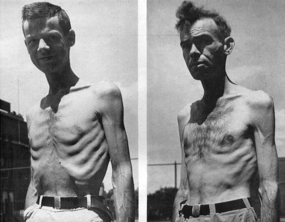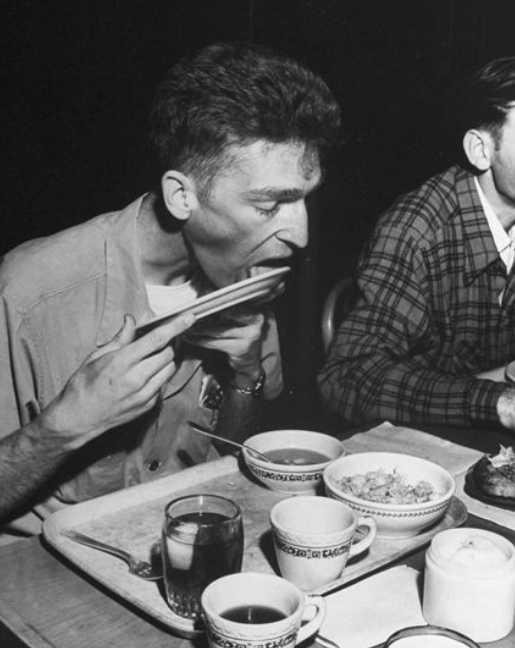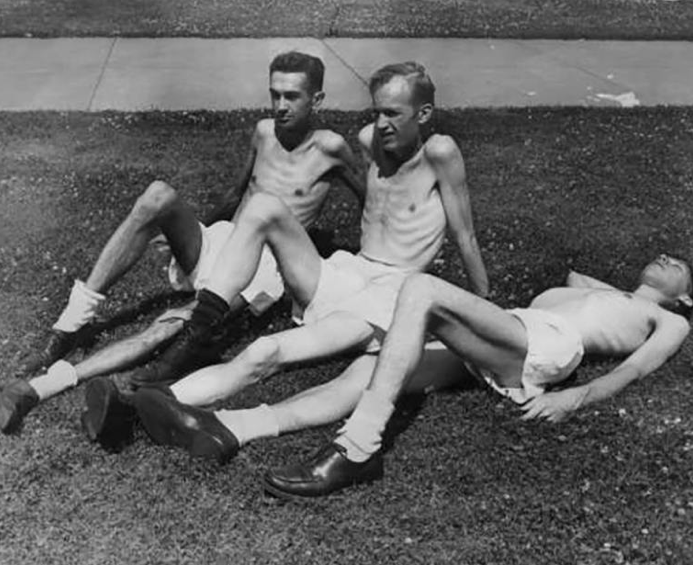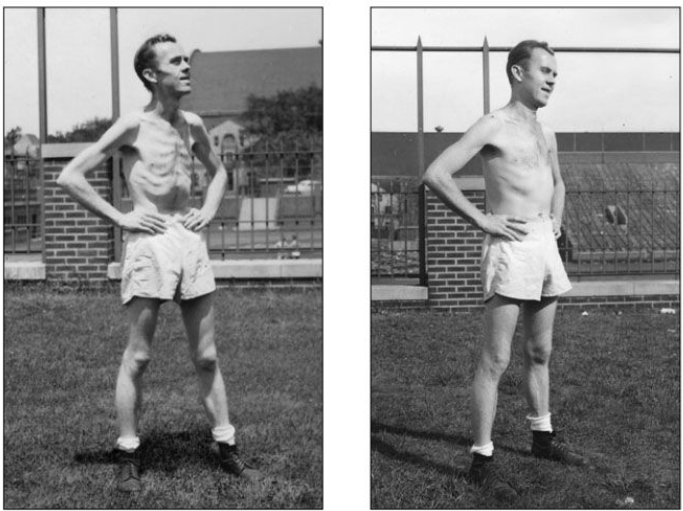Today I want to tell you, my precious sweet potatoes, about the Minnesota Starvation Experiment. The experiment was held at Minnesota State University in 1945. Men were asked to volunteer so that Ancel Keys, a physiologist who did research on how food changes the body, and his colleagues could learn how to best re-feed people who were starving during World War II once help had arrived. He was also really interested in learning about the mental impact of starvation.
Thirty-six healthy, normal weight-for-their-height participants were picked out of hundreds of volunteers due to their mental strength and dedication to the study. These men weren’t at war because they were conscientious objectors due to religious beliefs, but they wanted to help support the war effort. The study started with a three month period of the men being fed ~3200 calories per day to observe their normal metabolisms (yes, 3200 calories a day for a young, active man is normal). During this observation/stabilization period the men reported feeling well fed and full of energy. Then for the next six months their calorie intake was cut in half, to ~1570 calories a day.
Hold up.
1570 calories is more than my MyFitnessPal account lets me have if I say I want to lose weight. Now, you could say “yeah, Jen, but those are men, you’re a girl.” And I’d tell you 1570 calories a day was SEMI-STARVATION for these men. They became skeletal. They were licking their plates to get every last scrap. The whites of their eyes became pure white because their blood vessels constricted so much to preserve every ounce of energy and reduce their metabolism because their bodies knew that they couldn’t continue long like this and they would die. This experiment should’ve stopped all calorie-restricted diets, but the diet industry makes too much money off of people’s insecurities to be ethical.

ANYWAY.

Over the course of the six months, these men each lost about 25% of their starting body weight. They developed really bizarre eating habits, one participant wrote in his journal that people would “…coddle it like a baby or handle it and look over as they would some gold. They played with it like kids making mud pies.” It was documented that some participants would make really weird concoctions out of their food “one mixture that came near flooring me was potatoes, jam, sugar, gingerbread—all thrown into a bowl of oatmeal and used as a sandwich spread.” These bizarre food mixtures and food rituals (playing with food, sorting food, eating food in tiny bites, etc.) were something I regularly saw when I worked at an eating disorder treatment facility and is common with calorie deprivation. During this starvation period the men’s energies significantly dropped, with one man getting stuck inside of a rotating door because he was too weak to push it. Their irritability, anxiety, depression, and apathy spiked. Their desire to interact with others plummeted. They were obsessed with food, reporting they thought about food all day long, with one participant staying up until 5 am reading cookbooks with an insatiable obsession. One participant was excused from the study because he was having dreams of cannibalism and had to be admitted to a psychiatric hospital. Harold Blickenstaff, one of the men in the experiment, wrote, “I don’t know many other things in my life that I looked forward to being over with any more than this experiment. And it wasn’t so much … because of the physical discomfort, but because it made food the most important thing in one’s life … food became the one central and only thing really in one’s life. And life is pretty dull if that’s the only thing. I mean, if you went to a movie, you weren’t particularly interested in the love scenes, but you noticed every time they ate and what they ate.” During the restriction period, the men also experienced significant body dysmorphia, not recognizing how sick they looked.

After the six-month semi-starvation period was over, the men entered a three-month re-feeding and rehabilitation program. Re-feeding was a big part of what was being studied because if you re-feed too quickly there will be a depletion of elements responsible for muscle contractions (calcium, magnesium, potassium, and sodium), which can lead to a heart attack and death, so Ancel Keys wanted to figure out the best way to re-introduce food safely. For many of the men this re-introduction of food was more challenging than the starvation period because even when they were eating the same amount of food as they did before they started the study, the hunger was so immense. Their fat stores needed to be repleted before the bottomless hunger would subside, which led the men to eat over 11,000 calories in a single day.

I want to make something really clear: even though these men were eating literally until they became sick, none of them became obese. They did gain about 5-10% more than their usual weight at first, but it dropped back down to normal as they continued to eat normally. And this makes sense, right? Their bodies were under starvation circumstances, so to prevent that from happening again it’s smart that their bodies naturally make them gain a little extra fat, just in case. But once their bodies realized this was a temporary situation and food was plentiful and would continue to be plentiful, their weight naturally went back down. Your body is trustworthy; it knows what it’s doing and it’s only trying to keep you alive.
Diets don’t work because humans are hard-wired to survive, and one of our survival mechanisms is enduring famines, and diets are a version of a famine. I get that it’s easier said than done to just jump into trusting your body with food and weight, especially if you’ve been on diets your whole life and are still struggling, but we would be so happy to help.
-Jen Lyman, RDN, LD, CLT
hi I used this for a school project are you legit.